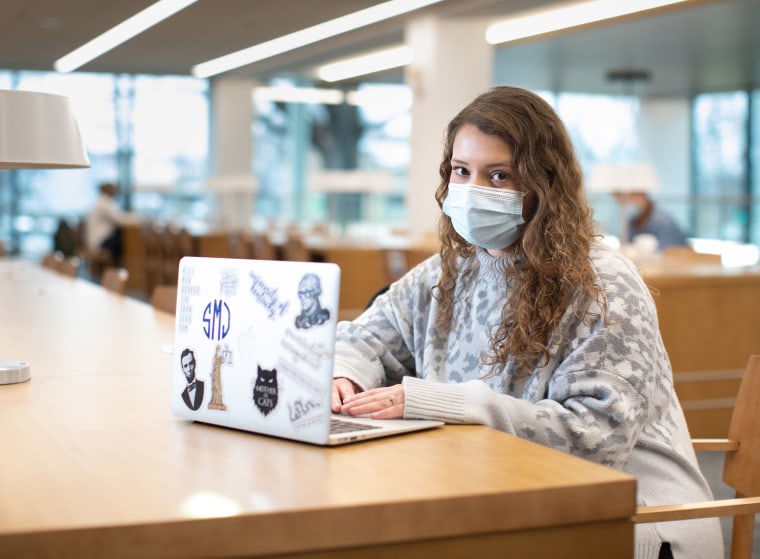When Shelby Ponder became sick over the summer with COVID-19 she felt like she had a very bad case of strep throat. Then she experienced relentless high fevers for two weeks. She started hallucinating and couldn’t sleep, maybe dozing for 30 minutes at a time — if she were lucky. It was only later that she learned that post-viral encephalitis contributed to headaches, vision problems and poor sleep.
“I wasn’t cognitively aware enough to even realize what was happening,” Ponder, 23, of Lexington, Kentucky, told TODAY. “Having brain swelling was not even a thought that crossed my mind or that it could really be serious.”

She’s speaking out about her story so that others protect themselves from COVID-19 and understand more about encephalitis. Encephalitis is defined as inflammation and swelling of the brain. It is most commonly caused by an infection such as a virus, or by the body’s defense systems, explained Tom Solomon, president of the Encephalitis Society, a UK-based nonprofit organization.
“I just want people to take the pandemic seriously,” Ponder said. “This is not something that you want anybody you care about to go through.”
COVID-19 caused unusual symptoms
In the summer, Ponder became ill after being exposed to family members with COVID-19. She went for a COVID-19 test that was negative and doctors treated her for what they thought was strep throat. When she coughed, she felt like she was having an asthma attack. Then she started having fevers ranging from 101 to 103.9 degrees for two weeks straight. She took acetaminophen and ibuprofen constantly, but the fever raged on.
“We couldn’t get it to break,” she said. “I was comatose nearly. I was sleeping around the clock, just up enough to eat and shower.”
She visited the emergency room and they tested her for numerous viruses. She tested negative for everything. Eventually her temperature went down to 99 and she felt well enough to return to work. But on her commute, something weird happened.
“My whole vision field started shaking and doctors later described it as nystagmus,” she explained. “My eyes were visibly shaking up and down and left and right and that was what my entire vision was doing as well.”
But Ponder, who still experienced some muddled thinking, didn’t understand how worrisome the symptom was. Her mom took her back to the emergency room where the doctors could see how her eyes shook. They admitted her to the hospital where they performed a lumbar puncture to understand what was causing her fevers and shaky vision. While she eventually felt better and returned home, a new symptom emerged. She couldn’t sleep and she felt lucky if she dozed for a half hour.
“I had gone close to a week without getting any quality sleep,” she said. “I thought I would never sleep again. When you have gone so far down that rabbit hole with just no sleep and no one understanding what is wrong with you, you just don’t really think there’s any hope.”
Help for encephalitis
Ponder visited Dr. Daniel Lee, the medical director of the Kentucky Neuroscience Institute, who diagnosed her with encephalitis and understood why her sleep was impacted. Anyone from infants to older adults can develop encephalitis. Several thousand cases are reported each year, yet the National Institute of Neurological Disorders and Stroke (NINDS) estimates that up to 60% go undiagnosed.
A recent study found that neurological complications are common in hospitalized COVID-19 patients. Doctors have reported an increase in patients with encephalitis because of COVID-19, though other viruses, such as herpes simplex virus, can lead to the condition as well.

“SARS-CoV-2, the virus which causes COVID-19, can cause encephalitis. We are seeing a lot of patients with encephalitis and other brain problems associated with COVID-19,” Solomon, president of a UK-based charity supporting those affected by encephalitis, told TODAY via email. “Patients with COVID-19 who have severe problems, such as encephalitis, are admitted to hospital. However, a lot of patients who had mild COVID-19 don’t feel well for many weeks afterwards, and brain fog i.e. difficulty concentrating and focusing, and poor memory seems to be part of this. It has not really been studied very well yet.”
According to NINDS, encephalitis can lead to:
- Mild flu-like symptoms
- Problems with speech or hearing
- Double vision
- Hallucinations
- Personality changes
- Loss of consciousness
- Impaired judgment
- Memory loss
- Seizures
- Muscle weakness
The inflammation in Ponder’s brain had impacted the areas responsible for sleep and her body produced too much of a chemical that kept her awake. After repeated tests, Ponder learned in November that the illness she had over the summer was in fact COVID-19, thanks to a positive antibody test.
Lee said that people with encephalitis can develop a variety of symptoms including headaches, problems with movement, an inability to speak or sleep troubles like Ponder experienced. But understanding where the problem is in the brain can help guide the treatment. He said the mechanism that prepares the body for sleep wasn’t working so her body kept her awake constantly.
“The middle part of the hypothalamus was completely swelled up,” Lee said. “The good news is we continue to monitor her with MRI scans of the brain and she is gradually improving in that regard. We are hopeful.”
Ponder started taking a drug that blocked the chemical responsible for keeping her awake. She noticed a change almost immediately.
“I slept five or six hours that very night,” she said. “I’ve never had any sleep problems and I never realized how fortunate I was … Without really good quality sleep you can’t function well.”
Last fall, Ponder felt healthy enough to return to law school.
“I can read everything. I can write and I just feel like a new person,” she said. “I don’t want to take for granted anymore how good it feels to be normal.”

Ponder says she shared her story because she hopes that others continue to take COVID-19 seriously and get the vaccine to prevent them from having complications like she did.
“I hoped that my case was the exception to the rule but it seems like it might become pretty common for people to experience encephalitis with COVID,” Ponder said. “We can’t safely assume that just because you are not an old person or you don't have underlying issues it does not mean that you cannot have a devastating experience with COVID.”

